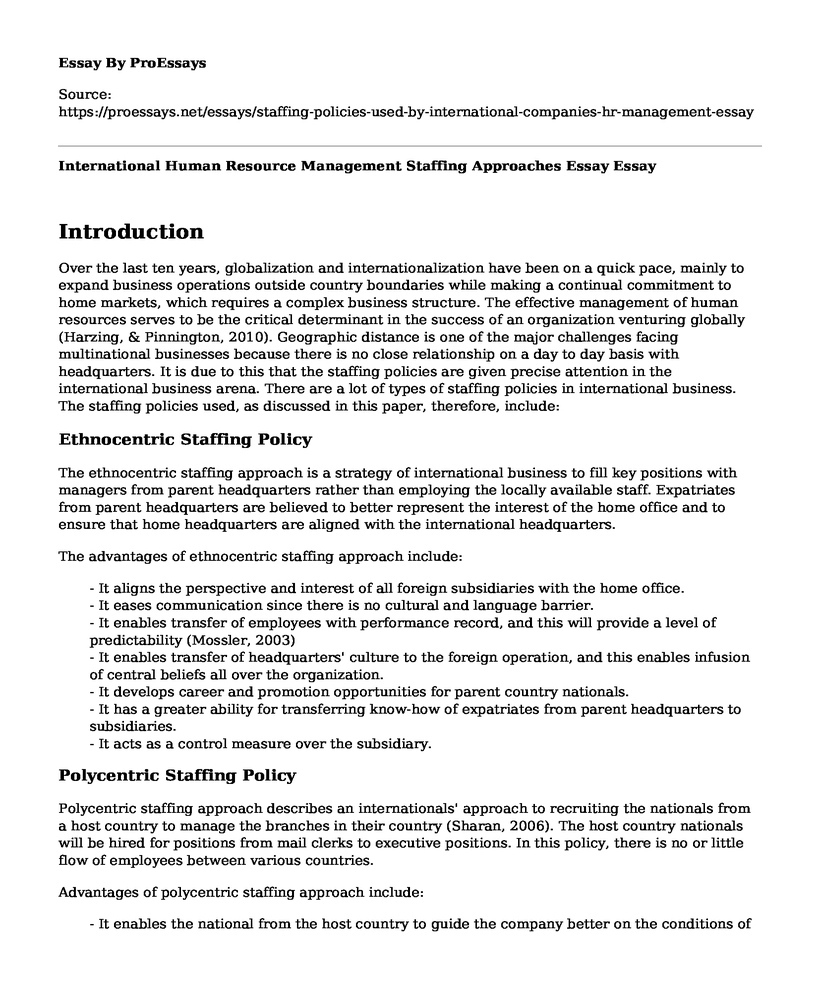Introduction
Over the last ten years, globalization and internationalization have been on a quick pace, mainly to expand business operations outside country boundaries while making a continual commitment to home markets, which requires a complex business structure. The effective management of human resources serves to be the critical determinant in the success of an organization venturing globally (Harzing, & Pinnington, 2010). Geographic distance is one of the major challenges facing multinational businesses because there is no close relationship on a day to day basis with headquarters. It is due to this that the staffing policies are given precise attention in the international business arena. There are a lot of types of staffing policies in international business. The staffing policies used, as discussed in this paper, therefore, include:
Ethnocentric Staffing Policy
The ethnocentric staffing approach is a strategy of international business to fill key positions with managers from parent headquarters rather than employing the locally available staff. Expatriates from parent headquarters are believed to better represent the interest of the home office and to ensure that home headquarters are aligned with the international headquarters.
The advantages of ethnocentric staffing approach include:
Polycentric Staffing Policy
Polycentric staffing approach describes an internationals' approach to recruiting the nationals from a host country to manage the branches in their country (Sharan, 2006). The host country nationals will be hired for positions from mail clerks to executive positions. In this policy, there is no or little flow of employees between various countries.
Advantages of polycentric staffing approach include:
Regiocentric Staffing Policy
In the regiocentric staffing model, employees are moved to subsidiary positions in other countries but stay in the same region. Facilities and company offices are regionally grouped as a single unit and work with autonomy from headquarters at home. A single region may consist of grouped countries, and the region develops its Human Resource Policies and Practices (Guo, Rammal, & Dowling, 2016). Regiocentric staffing policy allows transfer of employees between countries within the region but does not usually go beyond their home region.
The advantages of regiocentric staffing approach includes:
References
Guo, Y., Rammal, H. G., & Dowling, P. J. (2016). Global talent management and staffing in MNEs. Bingley: Emerald Group Publishing, 2016.
Harzing, A.-W., & Pinnington, A. (2010). International human resource management. London: SAGE.
Mossler, K. (2003). The Pros and Cons of International Staffing Policies. Munich: GRIN Verilog GmbH.
Sharan, V. (2006). International business: Concept, environment and strategy. Delhi: Pearson Education.
Wild, J. J., & Wild, K.L. (2015). International business: The challenges of globalization (8th Ed.). Don Mills, Ontario: Pearson Education.
Cite this page
International Human Resource Management Staffing Approaches Essay. (2021, Jun 17). Retrieved from https://proessays.net/essays/staffing-policies-used-by-international-companies-hr-management-essay
If you are the original author of this essay and no longer wish to have it published on the ProEssays website, please click below to request its removal:
- Essay on Human Performance Technology Model
- Ethics Issues Needed to Support Customer Needs Essay
- Strategic Human Resource Management (SHRM) Paper Example
- Paper Example on ICTs in Hospitality: Current Practices and Future Trends
- Essay Sample on Personality & Leadership: A Definition and Role in Society
- Team Assessment Exercise: Observing the Office for Successful Teamwork - Essay Sample
- Applying Nelson Mandela's Leadership Skills to My Leadership - Essay Sample







